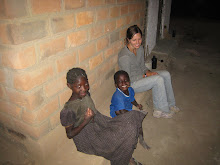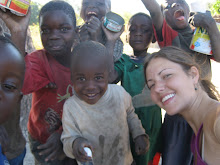WRITTEN MAY 9, 2008
Hello dear friends and family! I am sorry for the delay in posting this blog! After wasting a lot of time and kwatcha (zambian currency) trying, but failing, to update you before moving to Fiwila, I have decided to write out entries by hand and sending to my mom to type up.
Because this could turn out to be quite long, I want to start out by thanking everyone who has sent letter, packages and/or encouraging words through e-mail. This communication has meant the world to me and now that I am done with training and have more free time, I hope that I can catch p on some letter-writing! I promise I will respond to any letter sent, however, I should mention that I live 80 km away from the nearest post office in Mkushi, and I will most likely only make it there every two weeks at best. I assure you that letters are still worth the trip!
It has been so long since my last posting I am realizing I have a lot to tell you about! I am finally out of training and experiencing the real world of a Peace Corps Volunteer in Zambia. Honestly, I was not too disappointed to have to say goodbye to training but was sad to leave my host mother, Ba Vainess and her granddaughter, Bu Lucy, behind. (Inserting "Ba" before one's name is a sign of respect). I am so grateful to my host family for patiently listening to my broken Bemba, as well as teaching me the basics of being a woman in Zambian culture. They showed me how to carry a bucket of water on my head, how to properly tie a chitenge around my waist and how to stir the nshima pot so it comes out to the perfect consistency. Chiting? Nshima? You might be asking yourself. This clothing and food are two of the most basic aspects of Zambian culture.
Chitinges (pronounced shi-tayn-gays) are large pieces of beautifully colored fabric that women here use many ways. They are mainly used as a wrap-around skirt usually covering up pants or another skirt underneath. (I myself think that is just too hot and just wear one to cover up my underwear). Chitinges can also be used as a hair wrap, curtains, a cushion for your head while carrying a water bucket, or as a baby carrier. Village women wear chitinges all day, every day, and I have taken to doing the same. Many Peace Corps girls still prefer good old trousers, but I think chitinges are actually quite comfortable.
Nshima (pronounced n-she-maa) is the staple food of Zambia and many other surrounding countries. Eaten at both lunch and dinner, it is made from mixing a little bit of boiling water and a ton of cornmeal. Once it has reached the desired thickness it is dished out into lumps. I would compare it to cream of wheat or grits, only much firmer. Once you've got a good sized lump of nshima on your plate you use your hands to pick up pieces and roll them into balls. These balls are used to pick up all the other food on the plate. In Zambia, this food is called relishes. Relishes vary between rape, sweet potatos leaves, cabbage, pumpkin leaves, pieces of soya (similar to chicken but is vegetarian), eggplant, or even pasta or rice. I have learned to love nshima but I also enjoy the sweet potatoes in all forms, pasta dishes I make for myself, roasted corn on the cob, and meat pies found in Mkushi. Unfortunately a lot of fresh fruit like Mangos are only available seasonally, which is why I have requested dried fruit to be sent to me by anyone who feels like sending me something.
How my village obtains food is puzzling to me. I guess I'll be getting my food by bike. When I moved in last week I arrived "Costo-style" with 5 bags of rice, 2 huge jars of peanut butter, a 2-year plus supply of toilet paper, etc. I felt a bit awkward because Zambians hardly ever buy things in bulk and I also realized later that I came with more supplies than what 3 entire families combined would have here. Whenever I get worried or anxious about how I will "survive" I tell myself to relax, because these villagers have done it just fine for many years.
Even though I am in somewhat of an isolated site for Peace Corps Zambia I am slowly finding myself to be enjoying what us trainees started calling the "bush bush". Fiwila is beautiful and situated between two lush, green hills. Where paths have not been cleared or huts been constructed, tall trees and thick bushes provide welcoming shade during the hot days. This is different from the Africa I had envisioned. My mom had asked on the phone if I worried about wild animals. I had to laugh because there are goats, chickens, bush rats, wall spiders, lizards and the occasional snake. Hardly the Lion King Africa! (Sorry, Dad, we will have to find Hakuna Matata elsewhere if you come and visit.)
Fiwila was home to an Anglican mission hospital a few years back and although it has now been converted to a simple rural health center, the remnants of the mission can still be felt today. The heart of Fiwila seems to be more affluent than other villages I have visited in Zambia. However, I think the villages near here may be poorer. I have met the local priest (who seems to be the head honcho) as well as several nuns who are very welcoming toward me.
I live on a family compound in a 3-room mud hut, the largest in the compound I am embaressed to say. I feel undeserving of the celebrity treatment I sometimes receive here. My 82-year-old host father and his wife live a few yards from my hut. Four of their ten children all have respective huts on the compound. More grandchildren than I can count or match parents to run around playing and laughing all day and they never fail to make me smile. This family has treated me like a princess by bringing me water from a nearby stream and constantly giving me gifts of corn, sweet potatoes or cornmeal. I haven't yet shared a meal with my host family but I hope to do so very soon! I should mention Buddy, the black and brown mut who was previously owned by Katie, the volunteer I have replaced. My first day here he somehow understood I was his new owner and follows me faithfully wherever I go. He happily comes bounding over to greet me as soon as I emerge from my hut in the morning. No dog will ever replace Jasmine in my heart but I am beginning to bond with Buddy and so grateful that he is here with me.
With all this talk about Zambian life in general, who would have thought that I actually have work to do? My job description under Peace Corps "Community Action for Health Project" or CAHP is so detailed AND ambiguous I hesitate to even try to explain it to you. Basically, I am a health educator, teaching villagers how to better manage the six major health "threats": malaria, HIV/AIDS, childhood health and nutrition, integrative reproductive health, water sanitation, and tuberculosis. Peace Corps places a huge emphasis on sustainability, so I am not just a health educator, but someone who teaches how to teach others about health. On the side, I am also supposed to do "secondary" projects and I am hoping to do some work at the nearby orphanage.
Most Zambians who I will be working with will all be volunteering their precious time for learning. Finding the motivating factor may be the challenge for me. I know now to take baby steps. For example, I felt a huge sense of accomplishment after explaining to one person here about the work I was going to be doing.
The Rural Health Center is about a mile away from my hut and staffed by 2 nurses, several casual daily employees, and an environmental health technician. I will be working closely with this staff, as they are often my best link villagers. On Mondays, women come to receive supplies and information on family planning. On Tuesdays and Thursdays an ante-natal clinic for check-ups and certain supplements for expecting mothers. Then on Wednesdays an "under 5" clinic for women to bring their children who are monitored for weight, nutritional status, and receive proper immunizations. All of these clinics provide a way for mothers to socialize with each other as they wait to be seen and also an excellent opportunity for me to provide some education for them.
Meanwhile, my first 3 months in Fiwila are called "community entry" and my only real assignment is to acclimate to life in an African village and learn as much Bemba as possible, meeting and connecting with the villagers. So far life here is easier than I expected, however, I have certainly had my "moments".
I sometimes lie awake at night wondering WHAT is rustling around over in the corner of my hut (thanks Aunt Linda and Craig for providing the life-saving earplugs! and I still cringe using the pit latrine. I often find myself wondering if I am truly capable of the task at hand and whether I will fit in in a society where it is still common to be a school drop-out by age 15 and begin having babies. I worry whether it is any of my business to think I have something of value to offer these people when all I really have is a bachelors degree in Spanish and Linguistics of all things. Nevertheless, it is an incredible feeling to have a conversation with someone you would have never in your life talked to otherwise and I have already met some truly incredible and inspirational people, both American and Zambian. I have no doubt I will emerge a better person from this experience. Living without electricity or running water is surprisingly easy. I also enjoy the freedom of wearing the same clothes every day without anyone caring or noticing. I have no idea what my hair looks like. I never take the African sky for granted and I am impressed at how the Zambians are so friendly and hospitable.
I still feel this is worth the effort. While I could write forever, I think this will be all for now. I miss you all more than you know and think about you all the time! Keep those letters coming! Thanks for listening!!!
Love, Rachel



No comments:
Post a Comment